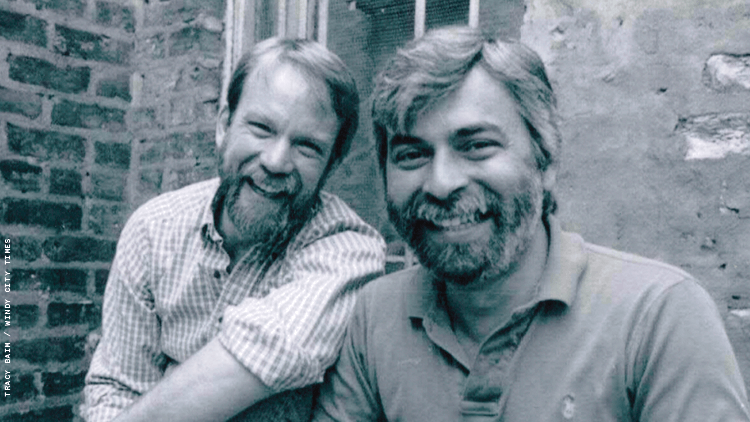A Love Story That Birthed an Iconic Gay Bar and a Lifetime of Activism
Author: Trudy Ring

A guy walks into a bar — and it changes his life, along with the lives of many other LGBTQ+ people.
That’s what happened to Art Johnston, who found his life partner and life’s calling because he went into a Chicago gay bar in 1973. The attractive bartender he met that night, José Pepe Peña, became the love of his life. Together they opened Sidetrack, one of the city’s longest-lived and most popular bars, and Johnston became one of Chicago’s leading activists for LGBTQ+ equality.
A documentary film telling their story, Art and Pep, is now in production. It’s both a love story and a history of activism, the filmmakers say.
“What really drew me in is that the whole thing is so rooted in love,” says director-producer Mercedes Kane. “I found the story to be so powerful and inspiring.”
Executive producer Kevin Hauswirth notes that as a young gay activist at the University of Illinois in the early 2000s, he would hear stories from his gay uncle and others “about what Art and his good troublemakers had been doing.”
What Johnston and his comrades had been doing included founding an LGBTQ+ rights organization; getting inclusive civil rights laws passed in Chicago, Cook County, and Illinois; raising funds to fight AIDS; and much more. That’s all part of the film’s story too.
Johnston, who grew up in rural Pennsylvania, had been teaching at a private school in the east when he came to Chicago in 1972 to attend graduate school at Northwestern University. Some friends told him about gay bars in the city, and one night the next year he wandered into one called Shari’s. He was immediately smitten with Peña, the bartender, and they’ve been together ever since, in a relationship that has been remarkably conflict-free, Hauswirth says.
Peña came up with the idea of opening their own bar so Johnston could make a living without being closeted and with freedom to be a political activist. Sidetrack opened in 1982 and is still a fixture on Chicago’s Halsted Street strip, having gone through significant expansions and weathered the COVID-19 pandemic. It’s noted for its themed video nights, focusing on an artist or a genre; show tunes night, held three times a week, is the biggest event.
With Peña focused on the business, Johnston has been active in many LGBTQ+ civil rights efforts (and continues to be). He helped persuade the Chicago City Council to pass a gay-inclusive human rights ordinance in 1988 (now covering transgender residents as well) and lobbied successfully for similar laws at the county and state levels. In the fight against AIDS, he and Sidetrack raised funds for organizations serving those affected, and Sidetrack distributed health information and condoms.
In 1991, Johnston and three other activists founded the Illinois Federation for Human Rights, which has become the state’s largest LGBTQ+ rights group, now known as Equality Illinois. It has had many victories at the state level, such as the passage of inclusive hate-crimes law and marriage equality (the latter in 2013, two years before the U.S. Supreme Court ruling), while lobbying for local nondiscrimination ordinances in various Illinois cities and working with the state’s congressional delegation on national matters, such as the still-pending Equality Act.
Hauswirth got involved with Equality Illinois when he was in college, and that’s how he met and became friends with Johnston and Peña. One day a few years ago he had been to a long lunch with them and heard many of their stories, which he shared with Kane, his longtime creative partner and an experienced documentary filmmaker (her most recent is What Remains: The Burning Down of Black Wall Street, about the Tulsa race massacre of 1921, out this year).
“It was Mercedes who insisted that more people need to know about their love and these stories, and we must make a film,” he recalls. Johnston and Peña weren’t keen on the project initially. “To call Art and Pep [‘s stars] reluctant subjects would be an understatement,” Hauswirth says. “But they eventually agreed to be the subjects of the film,” which is being produced by Kane’s nonprofit organization, Daisy May Productions.
Johnston and Peña on their wedding day
Production of Art and Pep began in November 2019, and the majority of filming wrapped in January of this year, although occasional shoots are still taking place. There are about 160 hours of footage, showing Sidetrack before and during the pandemic along with Johnston and Peña’s life over the years, plus more than 35 interviews with Sidetrack employees, family members, activists, politicians, and more.
The interviewees include a new generation of activists, Hauswirth says, such as Channyn Lynne Parker, a trans advocate and Equality Illinois board member; Mike Simmons, the first out Illinois state senator and only the third Black queer state senator in the nation; and Equality Illinois CEO Brian Johnson.
The filmmakers are now doing a crowdsourcing and crowdfunding campaign to gather archival footage and raise money to support editing and distribution of Art and Pep, which they plan to release in 2022. Hauswirth and Kane would love to premiere the film at festivals and hope it will be picked up by a network or streaming service.
They believe strongly that they have a story worth telling. While Johnston’s activism is well known, at least in Chicago LGBTQ+ and political circles, the love story between him and Peña has really never been told, Hauswirth notes. The film, he says, “is a living history of a love story that has lasted for more than 40 years.”
Watch a teaser for the film below, and find out more at ArtAndPep.org.
Original Article on The Advocate
Author: Trudy Ring





